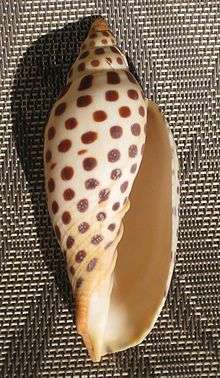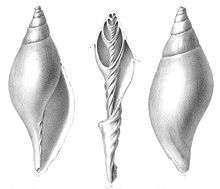Volutidae
Volutidae, common name volutes, are a taxonomic family of predatory sea snails that range in size from 9 mm to over 500 mm, marine gastropod mollusks. Most of the species have no operculum.
| Volutidae Temporal range: Cretaceous to Recent | |
|---|---|
| A live individual of the Hebrew volute Voluta ebraea in its natural habitat | |
| Scientific classification | |
| Kingdom: | Animalia |
| Phylum: | Mollusca |
| Class: | Gastropoda |
| Clade: | Caenogastropoda |
| Clade: | Hypsogastropoda |
| Clade: | Neogastropoda |
| Superfamily: | Volutoidea |
| Family: | Volutidae Rafinesque, 1815 |
| Subfamilies | |
|
See text | |

Distribution
This family of sea snails are found mainly in tropical seas, though some species also inhabit the waters of the polar circles.
Shell description
The shell of species such as Melo amphora can grow as large as 50 cm (19.7 inches) in length.[1]
Volutes are distinguished by their distinctively marked spiral shells (to which the family name refers, voluta meaning "scroll" in Latin).
The shells have an elongated aperture in their first whorl and an inner lip characterised by a number of deep plaits. The elaborate decorations of the shells has made them a popular collectors' item, with the imperial volute (Voluta imperialis) of the Philippines being particularly prized.
Taxonomy
Subfamilies and tribes
According to Bail & Poppe (2001)[2] Volutidae can be subdivided into the following Subfamilies and tribes:
- Amoriinae Gray, 1857
- Tribe Meloini Pilsbry & Olsson, 1954
- Tribe Amoriini Gray, 1857
- Athletinae Pilsbry & Olsson, 1954
- Calliotectinae Pilsbry & Olsson, 1954
- Cymbiinae H. Adams & A. Adams, 1853
- Fulgorariinae Pilsbry & Olsson, 1954
- Plicolivinae Bpichet, 1990
- Scaphellinae Gray, 1857
- Volutinae
- Tribe Lyriini Pilsbry & Olsson, 1954
- Tribe Volutini Rafinesque, 1815
Genera
Genera within the Volutidae include:
- Adelomelon Dall, 1906
- Alcithoe H. Adams & A. Adams,1853
- Amoria Gray, 1855[3]
- Ampulla Röding, 1798
- Arctomelon Dall, 1915
- Athleta Conrad, 1853
- Callipara Gray, 1847
- Calliotectum Dall, 1890
- Cymbiola Swainson, 1831
- Cymbiolacca
- Cymbium Röding, 1798
- Enaeta H. Adams and A. Adams, 1853
- Ericusa H. Adams and A. Adams, 1858
- Festilyria Pilsbry & Olsson, 1954
- Fulgoraria Schumacher, 1817[4]
- Fusivoluta E. von Martens, 1902
_-_Volutidae_-_Mollusc_shell.jpeg)
- Harpovoluta Thiele, 1912
- Harpulina Dall, 1906
- Iredalina Finlay, 1926
- Leptoscapha Fischer, 1883
- Livonia Gray, 1855
- Lyria Gray, 1847
- † Mauira Marwick, 1943
- † Mauithoe Finlay, 1930
- Melo Broderip in Sowerby I, 1826
- † Metamelon Marwick, 1926
- Minicymbiola Klappenbach, 1979
- Miomelon Dall, 1907
- † Mitreola Swainson, 1833
- Nannamoria Iredale, 1929
- Nanomelon Leal & Bouchet, 1989
- Neptuneopsis Sowerby III, 1898
- Notopeplum Finlay, 1927
- Notavoluta Cotton, 1946
- Odontocymbiola Clench & Turner, 1964
- † Pachymelon Marwick, 1926
- Paramoria McMichael, 1960
- Plicoliva Petuch, 1979
- Provocator Watson,1882
- Scaphella Swainson, 1832
- Spinomelon Marwick, 1926
- Tenebrincola Harasewych & Kantor, 1991
- Teramachia
- Tractolira Dall, 1890
- Voluta Linnaeus, 1758
- Volutifusus Conrad, 1863
- Volutoconus Crosse, 1871
- Waihaoia Marwick, 1926
- Zygomelon Harasewych & Marshall,1995
- Zidona H. Adams and A. Adams, 1853
References
- Poutiers, J. M. (1998). Gastropods in: FAO Species Identification Guide for Fishery Purposes: The living marine resources of the Western Central Pacific Volume 1. Seaweeds, corals, bivalves and gastropods. Rome, FAO, 1998. page 597.
- Bail, P. & Poppe, G. T. (2001). A taxonomic introduction to the recent Volutidae. In: Poppe, G. T. & Groh, K.: A Conchological Iconography. 30 pp., 5 plts. ConchBooks, Hackenheim, ISBN 3-925919-47-3.
- Bail, P., Limpus, A. & Poppe, G. T. (2001): The Genus Amoria. In: Poppe, G. T. & Groh, K.: A Conchological Iconography. 50 pp., 93 plts. ConchBooks, Hackenheim, ISBN 3-925919-46-5.
- Bail, P., Chino, M. & Terryn, Y. (2010). The Family Volutidae. The endemic Far East Asian subfamily Fulgorariinae Pilsbry & Olsson, 1954. A revision of the recent species. In: Poppe, G. T. & Groh, K.: A Conchological Iconography. 74 pp., 64 plts. ConchBooks, Hackenheim, ISBN 978-3-939767-31-2.
- ITIS
- "Volute." Encyclopædia Britannica, 2006.
- Powell A W B, New Zealand Mollusca, William Collins Publishers Ltd, Auckland, New Zealand 1979 ISBN 0-00-216906-1
- Merle & Pacaud & Marivaux, 2014 <ref> Merle & Pacaud & Marivaux, Volutidae (Mollusca: Gastropoda) of the Lakhra Formation (Earliest Eocene, Sindh, Pakistan): systematics, biostratigraphy and paleobiogeography; Zootaxa, 3826 (1) : 101-138, fig. 1-12. , 2014
External links
- Biodiversity Library: Maxwell Smith, A review of the Volutidae, Beal-Maltbie Shell Museum, Florida, 1942
- Miocene Gastropods and Biostratigraphy of the Kern River Area, California; United States Geological Survey Professional Paper 642

| Wikimedia Commons has media related to Volutidae. |
